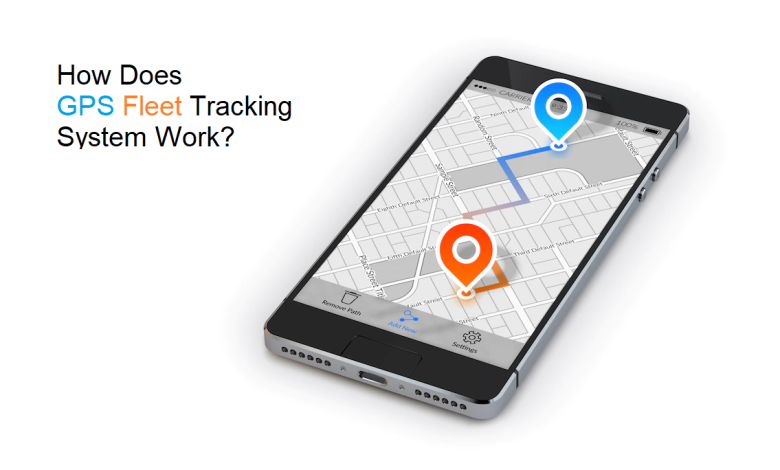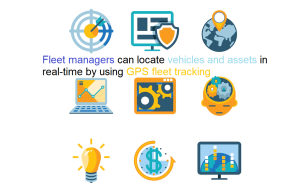Ways GPS Tracking Streamlines Fleet Management

The Global Positioning System, or GPS, tracks an object’s movements and determines its location using a network of satellites and other devices. The logistics and transportation industries greatly benefit from real-time monitoring of their vehicles’ activities. Due to the effective management of fleets they enable, GPS tracking systems are currently becoming a standard feature in the transportation sector. The use of GPS can improve business productivity and streamline operations in a variety of ways.
GPS fleet tracking is also crucial in delivering better logistics mobility solutions that closely monitor fleets’ general well-being and efficiency. This technology has undoubtedly transformed the transportation sector by analyzing factors such as vehicle utilization, fuel consumption, cost evaluations, route planning, and more. As a result, it determines how fleets operate on a daily basis.
Fleet Tracking: What is it?
A fleet tracking management system uses GPS tracking to track the whereabouts and activities of assets and fleet vehicles. Fleet managers can locate vehicles and assets in real-time by using GPS fleet tracking, which combines cellular and satellite technology. Tracking systems, for instance, can display how long drivers spend loading docks before moving on to the following stops. As a fleet manager or owner-operator, you can find ways to make their pickups and deliveries more effective if the time period is too long. They can reduce loading time and increase daily productivity in this way.
The most precise information on vehicle movements and locations, as well as on fuel usage and emissions levels, time spent on the job site, and equipment usage, is obtained with GPS fleet tracking. GPS provides fleet managers with the information they need to make strategic decisions and boost the return on their assets and vehicles.
How Does GPS Fleet Tracking System Work?
Your commercial vehicle’s GPS fleet tracker connects to a constellation of satellites to determine the vehicle’s location. The tracker uses a trilateration technique that considers its own location and the positions of at least three satellites in the GNSS network.
The GPS tracker determines the vehicle’s latitude and longitude coordinates (along with time and elevation) through trilateration and sends out a signal in real-time with the information. The signal and the transmitted coordinates are picked up by a wireless carrier tower, which then sends them to a cloud server. You can connect to that cloud server and obtain real-time GPS data about the location of your vehicle if you use fleet tracking or management software.
GPS for Fleet Management: Top 6 Benefits
By giving you unmatched access to and control over all fleet operations, a GPS tracking system investment can propel your company to new heights. Therefore, making the lives of fleet owners and drivers easier is everything you need to run a successful logistics business. Here are a few benefits of using a GPS tracking system.
#1. Gather precise fleet data
Gathering pertinent information about your fleet is the cornerstone of fleet management improvement. And completing it hasn’t been simple. Who has the time to observe and record data on every machine and vehicle constantly? No, not the fleet managers or owner-operators.
Even the information you have gathered on your own might not be entirely accurate. It might only be basic information like a GPS location that needs to be manually updated. While GPS is a great tool, actual machine location isn’t particularly ground-breaking or valuable when it comes to maximizing your fleet’s profitability. In fact, inaccurate data is frequently worse than no data at all.
The data can then be compiled for you by telematics software in a sensible manner, providing insightful information that can be used. The software can create graphs, spot trends, and generate reports to give you a complete picture of the condition of each machine and vehicle in your fleet. Telematics makes the difference between gathering factual, current information in a way that is beneficial to your operation and collecting incomplete, inaccurate data.
#2. Increase effectiveness and promote savings
Fleet operating costs are reduced by GPS tracking, increasing profits. GPS tracking solutions reduce the amount of paperwork that mobile workers must complete or submit and the amount of paperwork that back-office staff must sort through by automating reports like timesheets and fuel receipts. As a result, mobile workers can spend more time carrying out their duties and less time completing paperwork.
For emergency fleets, efficiency is crucial. Everyone involved—the dispatcher, the tech, and the client—experiences added stress due to the frantic attempts to reach the closest technician. GPS tracking software expedites dispatching, stops this circling around, and enables your team to show up on the scene prepared to save the day. Fleet managers are much more efficient at this step because they can access detailed maps and know exactly where each vehicle is.
#3. Increased Safety
GPS is known to be a useful tool for ensuring the safety of drivers and fleets, which is its main advantage. Companies are able to monitor driver behavior to make sure that safe driving procedures are being followed. An excellent way to prevent theft is to track vehicles and use virtual geofenced boundaries. Real-time alerts to fleet managers are also helpful for giving drivers immediate help and support in an emergency.

#4. Reduce Thefts
Your equipment and vehicles are vital resources. But what happens if the vehicle gets stolen? What if your large container, which has been on a job site for a year, goes missing all of a sudden?
GPS tracking devices can assist fleets in speedily recovering lost or stolen vehicles or equipment and can give you useful information to use in conjunction with your staff and the police to locate a stolen vehicle. Anyone who is entrusted with a pricey corporate asset will have serious peace of mind with that.
#5. Route Improvement
It enables companies to manage their fleets by figuring out the quickest routes. By controlling the driver schedules, total stops, available hours, and other factors, embracing technological advancements often results in shorter turnaround times. Therefore, manual or human competencies cannot determine the most effective routes.
Consequently, it has become crucial for businesses to spend money on sophisticated route-planning software. Using software to optimize the routes gives fleet managers complete ground-level visibility.
#6. Get to know the exact machine utilization
Every fleet has at least one machine parked in a corner that is probably underutilized. Fleet managers could only make a rough estimate when determining whether utilization outweighed ownership costs in the past. But you can calculate it thanks to telematics technology precisely.
This data, which tracks everything from engine runtime to days spent on location, can be easily mined to determine how assets are being used. With this information, you can confidently decide what to keep, rent out, and sell.
To Sum Up
Some of the key benefits of GPS tracking systems for fleet management include the ones listed above. It can raise an organization’s productivity and profitability. Investing in a unique, multifunctional technology is regarded as a long-term necessity for managing fleets. As a result, fleet managers can increase their credibility by gathering accurate information, which significantly impacts the company’s expansion.



